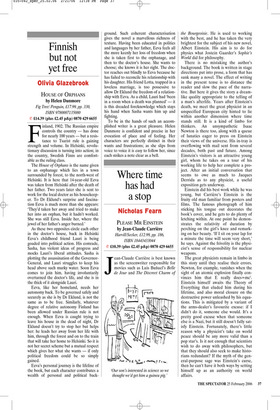Where time has had a stop
Nicholas Fearn
PLEASE MR EINSTEIN by Jean-Claude Carrière Harvill/Secker, £12.99, pp. 186, ISBN 18443433044 ✆ £10.39 (plus £2.45 p&p) 0870 429 6655 Jean-Claude Carrière is best known as the screenwriter responsible for movies such as Luis Buiiuel’s Belle de Jour and The Discreet Charm of the Bourgeoisie. He is used to working with the best, and he has taken the very brightest for the subject of his new novel, Albert Einstein. His aim is to do for physics what Jostein Gaarder’s Sophie’s World did for philosophy.
There is no mistaking the author’s background. The book is written in stage directions put into prose, a form that has sunk many a novel. The effect of writing in the present tense is to distance the reader and slow the pace of the narrative. But here it gives the story a dreamlike quality appropriate to the telling of a man’s afterlife. Years after Einstein’s death, we meet the great physicist in an unspecified European city hinted to lie within another dimension where time stands still. It is a kind of limbo for thinkers. An unsympathetic Isaac Newton is there too, along with a queue of lunatics eager to press on Einstein their views of the universe. His in-tray is overflowing with mail sent from several decades, both past and future. Among Einstein’s visitors is an attractive young girl, whom he takes on a tour of his working life to help her complete a project. After an initial conversation that seems to owe as much to Jacques Derrida as to any physicist, a useful exposition gets underway.
Einstein did his best work while he was young, but Carrière’s Einstein is the fruity old man familiar from posters and films. The famous photograph of him sticking his tongue out decorates the book’s cover, and he gets to do plenty of letching within. At one point he demonstrates the relativity of duration by perching on the girl’s knee and remarking on her beauty. ‘If I sit on your lap for a minute the time will seem very short,’ he says. Against the frivolity is the physicist’s sense of responsibility for nuclear weapons.
The great physicists remain in limbo in this story until they realise their errors. Newton, for example, vanishes when the sight of an atomic explosion finally convinces him that E really does=mc2. Einstein himself awaits the Theory of Everything that eluded him during his lifetime, and also moral closure on the destructive power unleashed by his equations. This is mitigated by a variant of the arms-dealer’s favourite excuse: if I didn’t do it, someone else would. It’s a pretty good excuse when that someone else is a Nazi, but it still doesn’t fully satisfy Einstein. Fortunately, there’s little reason why a physicist’s take on world peace should be any more valid than a pop star’s. Is it not enough that scientists wish to do away with philosophers, but that they should also seek to make historians redundant? If the myth of the general-purpose sage was Einstein’s curse, then he can’t have it both ways by setting himself up as an authority on world affairs.


































































 Previous page
Previous page